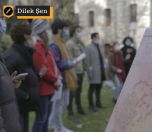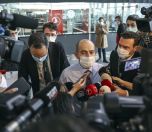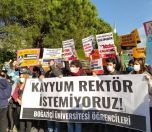* Photo: Dilek Şen - bianet
Click to read the article in Turkish
Human Rights Watch (HRW) has prepared a report regarding the violations of rights committed during the protests against the appointment of Prof. Melih Bulu as a rector to Boğaziçi University by President and ruling Justice and Development Party (AKP) Chair Recep Tayyip Erdoğan.
Sharing the results of its report with the public today (February 18), the HRW has raised concerns that the "Turkish authorities have placed hundreds of student protesters under possible criminal investigation."
"Students and the academic staff of Boğaziçi have exercised their lawful right to peacefully express their opposition to the appointment, which they regard as a move to impose government control over the institution and undermine academic autonomy and freedom," the HRW has noted.
Hugh Williamson, the Europe and Central Asia Director at the HRW, has also said, "Erdoğan's appointment of an unelected rector to Boğaziçi University and the violent arrests of students who had peacefully protested the move encapsulates the government's disregard for basic human rights."
"Imposing an unelected presidential-appointee rector on a university with no consultation demonstrates a lack of respect for academic freedom and the autonomy of universities in Turkey."
Regarding the hate speech and discriminatory attitude targeting the LGBTI+ students during the protests, Williamson has said:
"The authorities should protect and affirm LGBT students' rights to organize and express themselves, rather than attacking them.
"The Turkish authorities should respect the right to assembly, stop using abusive police power to silence dissent, and ensure the immediate release of students arbitrarily detained."
HRW followed the protests
The HRW interviewed eighteen students, including four who had been released from police custody, four lawyers, and two academics, analyzed images and legal documents, and monitored four student protests.
The organization has shared the following observations:
"The protests by students and faculty members started after President Erdoğan appointed Melih Bulu as the Boğaziçi University rector on January 1, 2021. Bulu, a political ally of the president's Justice and Development Party (AKP), has worked in academia and in the defense industry, and previously served as rector of two private universities.
"After police harshly dispersed protests at the campus on January 4, the Istanbul prosecutor at 3 a.m. on January 5 issued arrest warrants and ordered the confiscation of cell phones, laptops, and data storage devices of at least 28 students, allegedly at the request of the city's governor.
"At around 5:30 a.m. police raided at least 17 houses, in a few cases the wrong houses, and broke down doors, and in one case walls, to arrest students who took part in protests a day before.
"In the following weeks, demonstrations in support of the Boğaziçi protests were held in other parts of Istanbul and in 38 cities across Turkey.
"The authorities have responded to some of the demonstrations with excessive police force, summary arrests, and targeted house raids. They arrested more than 560 protesters in all, most of whom were released after a short time. Protesters detained in Istanbul in early January, all of whom were released, told Human Rights Watch that the police conducted strip-searches and verbally abused and threatened them in some cases.
"Three reported that police held guns to their heads during house raids, and two said the police also slapped and insulted them.
Accusations of Erdoğan
"The president and senior officials have directly encouraged a tough police response throughout. President Recep Tayyip Erdoğan initially referred to the student protesters as 'lazy and narrow-minded' but, together with other government officials, later began to suggest they had terrorism links, an allegation widely used by the Turkish authorities to criminalize democratic opposition and government critics.
"Lesbian, gay, bisexual, and transgender (LGBT) students and protesters have been playing a key role in ongoing demonstrations. On January 29, the authorities initiated a targeted crackdown on LGBT students and protesters after students mounted an exhibition on Boğaziçi campus in solidarity with the ongoing protests that included, among many other pieces, an artwork depicting the Kaaba, the most important holy site for Muslims, combined with LGBT flags and a mythological creature that is half-snake half-woman.
"Police arrested two students who appeared in a video of the exhibition that was streamed to the internet, and two others who were presumed to be among LGBT organizers on campus.
"On the same day, the police raided a room used by a student LGBT club and confiscated flags and books. Two days later, Bulu, the new rector, shut down the students' LGBT club.
"The interior minister and Justice and Development Party's (AKP) spokesperson called the students "perverts" on several social media platforms, apparently alluding to the artwork. Courts placed two of the students in pretrial detention and two under house arrest on suspicion of "inciting hatred and enmity" (Turkish Penal Code article 216/1).
"Courts have placed at least 25 protesters under house arrest, and 9 remain in pretrial detention at the time of writing, on suspicion of 'inciting hatred' and 'violating the law on demonstrations' and for 'resisting police orders.' Dozens were released under judicial control. The arrests and detentions come against the backdrop of heavy restrictions on public protest in Turkey; abuses of power by the government to silence critical groups; and targeting of minority groups, including LGBT people. The authorities have sometimes justified bans on demonstrations by citing the risk of Covid-19 alongside unspecified threats to public order." (DŞ/SD)
* Click here for the full report








